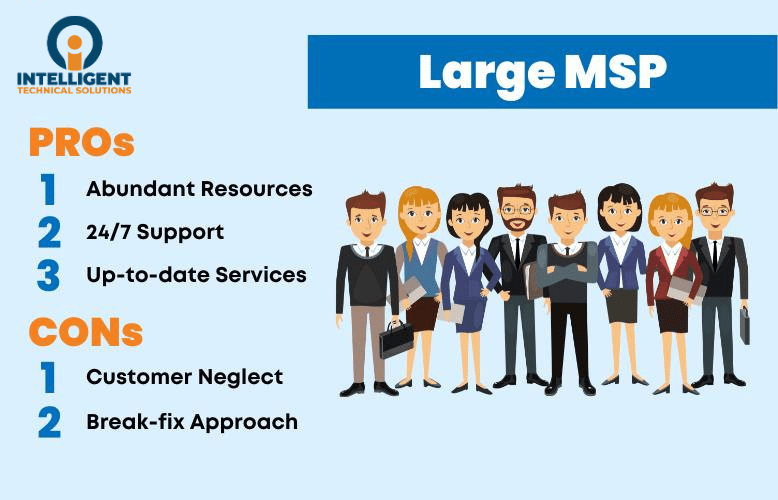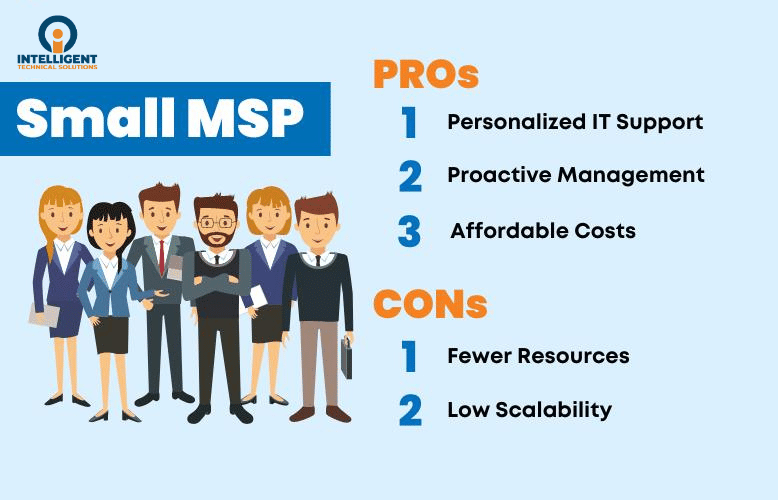The Pros & Cons of Small and Large Managed Service Providers [Updated]
February 20th, 2024 | 4 min. read

Editor's note: This post was originally published on January 12, 2023 and has been revised for clarity and comprehensiveness.
Does MSP size matter?
People have their preferences. Some like working with large managed service providers (MSPs), while others lean towards smaller companies.
If you have no experience working with an MSP and are still weighing your options, this article is for you. While we want to nudge you toward large MSPs like us, Intelligent Technical Solutions (ITS), the truth is some benefits come with working with smaller MSPs.
We’ve been on both sides of the spectrum. We were once the small MSP trying to one-up our larger competitors. Now, ITS has grown - we no longer consider ourselves small, and we’ve recognized the difference in our services and how we deliver them.
You can rest assured that we will be completely objective and unbiased throughout this article as we lay out the pros and cons of both small and large MSPs. Hopefully, this helps you in the process of looking for the right one for your business.
Pros and Cons of a Large MSP

Pros
There’s a lot of relief that comes with partnering with large MSPs because of the following advantages:
1. Abundant Resources
An abundance of resources paves the way for the best services. Larger MSPs can more easily employ experts and procure the necessary equipment to support your business. With these at hand, you can count on their full support when it comes to achieving your goals.
2. 24/7 Support
Larger MSPs also – more often – provide 24/7 support. You will never have to worry about downtime because your MSP will ensure that someone is always available to assist you whenever you need it, guaranteeing smooth operations and secure networks.
3. Up-to-date Services
Technology shifts fast, and keeping up with these changes is crucial to your business’s success. Luckily for you, this is something that a large MSP can do. They’ll ensure that your systems and networks comply with the latest policy changes and are ready to counter the newest cyberattacks.
Cons
Unfortunately, there are also downsides to larger MSPs.
1. Overlooked Customers
We did mention an abundance of resources as one of the benefits of large MSPs, and you would think that would equate to hands-on and client-focused service, but that’s not always the case. Sometimes, these organizations are too big. They handle so many clients at a time that some concerns get lost in the cracks and are forgotten.
You need to find out if your MSP has the capacity, despite its size, to still give you quality service. MSPs often overcome this disadvantage with enough resources, IT staff training, and attention to detail.
2. Unconscious Break-fix Approach
Due to their large size, some larger MSPs accidentally implement a light break-fix approach for companies. The break-fix approach is when your MSP steps in only when an issue needs to be resolved. This means they might overlook patch updates, IT road mapping, or other proactive IT measures.
However, a well-run MSP will not let this happen. MSPs with years of experience and multiple checks and balances can easily prevent slipping into a break-fix approach.
Pros and Cons of a Small MSP

Pros
Bigger isn’t always better. Small MSPs can also offer unique benefits to their clients, such as:
1. Personalized IT Support
One of the main reasons people decide to work with small MSPs is their ability to provide personalized services. This means they can create a program specifically designed to solve your IT needs, ensuring you only get services relevant to your business. In addition, small MSPs are usually local providers who have knowledge of your business environment and market base.
2. Affordable Costs
The services of small MSPs are usually more affordable than their large business counterparts. We understand, however, that some people take this as a caution – as low costs might mean lackluster service.
In some cases, yes, the quality goes down with smaller MSPs. But that’s not often the case – they might have less staff to maintain, simpler tools, or less infrastructure that pushes costs down. It would be best to ask why their fees are lower and what this will mean for your business.
RELATED: Why MSPs Seem Expensive and What You're Getting for Your Money
Cons
Now, the cons:
1. Fewer Resources
The lack of resources from your provider can affect you in different ways. They might not be prompt with their support or lack the service you need. It is also possible for them to lag behind and not have the most advanced solutions.
Moreover, you must consider that their efforts could be divided once they start taking on more clients. Although this is a great cause for concern, remember that this is on a per-case basis, meaning it does not apply to all small MSPs.
2. Low Scalability
If your business grows and expands, your MSP should be able to keep up, and this is one issue with partnering with small MSPs: they're easy to outgrow. While this isn’t something you have to worry about at the start, it’s important to keep this in mind, especially if you have great aspirations for your business.
|
Large MSPs |
Small MSPs |
||
|
Pros |
Cons |
Pros |
Cons |
|
Abundant Resources |
Overlooked Customers |
Personalized IT Support |
Fewer Resources |
|
24/7 Support |
Unconscious Break-fix approach |
Affordable Costs |
Low Scalability |
|
Up-to-date Services |
|
|
|
Ready To Choose an MSP Partner?
So, yes, size does matter. Small and large MSPs have advantages and disadvantages that you should consider when in the market for one.
Here's the thing, though. While size does matter, it's not the only thing that matters.
There needs to be an account of your resources and IT needs, and the MSP you choose should be able to align with these. It would be best to look for the crucial qualities an MSP should have.
And if you want to learn more about when vetting MSPs, check out these other articles from our Learning Center:
- How to Choose the Best IT Service Provider? (Key Considerations)
- What Businesses Should Look for in an MSP Proposal
- 15 Questions to Ask When Comparing Managed IT Providers
You can also schedule a no-obligation meeting with our consultants to determine if ITS could be the MSP for you.
Kharmela Mindanao is a senior content writer for Intelligent Technical Solutions. She’s called Ella by her friends and likes yoga, literature, and mountain climbing. Her favorite book is Anxious People by Fredrik Backman. She creates art and poetry and is on a quest to find the best cheesecake.
Topics:
